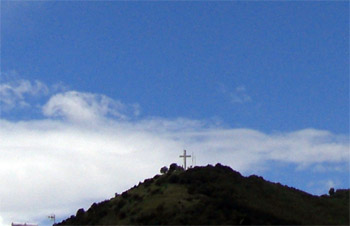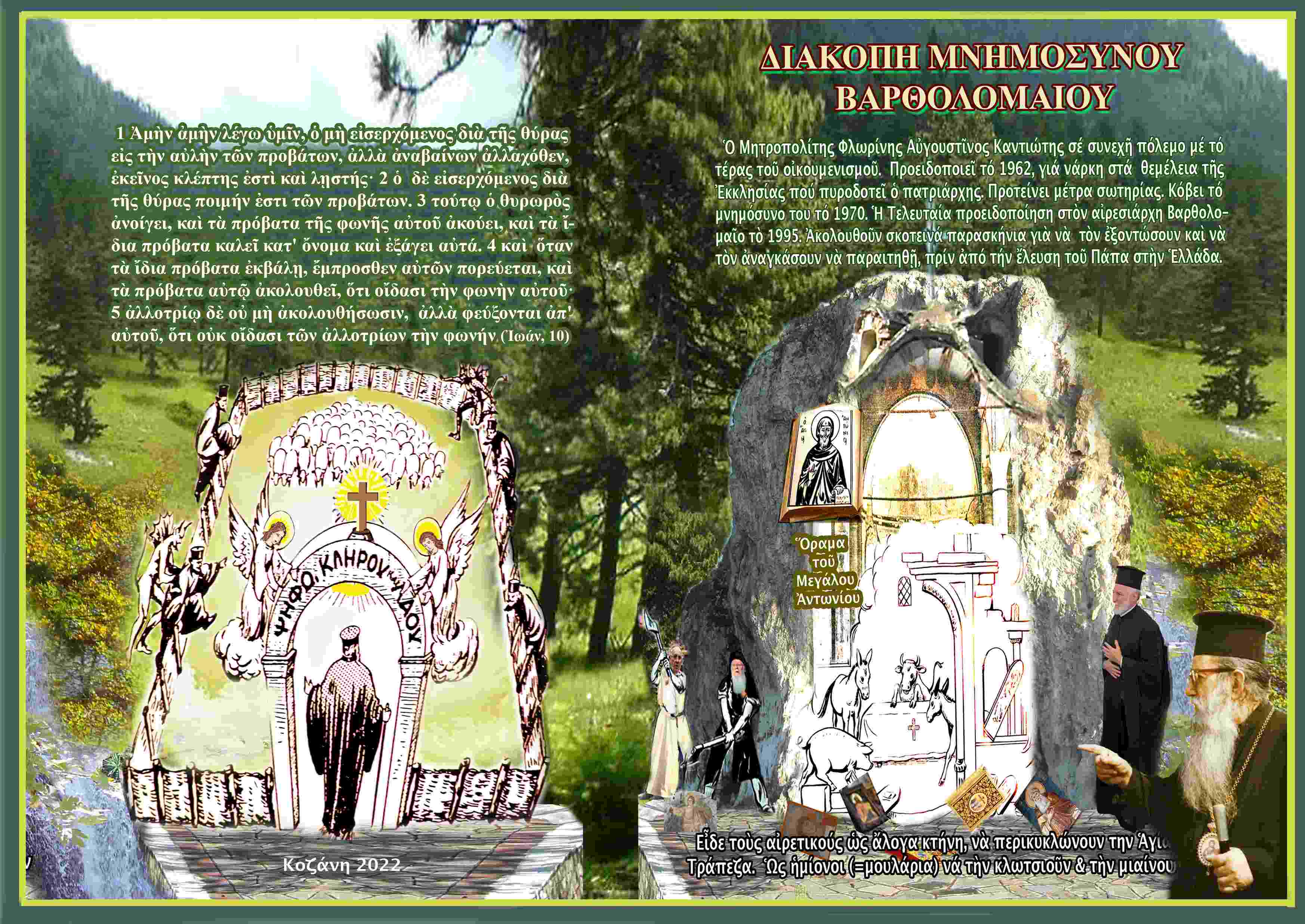THE SACRIFICE (Η ΘΥΣΙΑ)
 Ιούν 19th, 2010 |
Ιούν 19th, 2010 |  Filed under: English
Filed under: English
Απόσπασμα από τό βιβλίο του πατρός Αυγουστίνου
«Είς τήν Θείαν Λειτουργίαν, Πρακτικαι Ομιλίαι»!
Ομιλία 10
Η ΘΥΣΙΑ
Η μετάφρασι ολόκληρου του βιβλίου (δύο τόμους) στά Αγγλλικά έγινε από τόν ακούραστο εργάτη καί αγωνιστή της Ορθοδοξίας, πνευματικόν τέκνον του π. Αυγουστίνου, π. Αστέριο Γεροστέργιο. Προσφέρεται ταπεινά καί μέ τήν έν Χριστώ αγάπη είς ψυχικήν ωφέλειαν Ορθοδόξων Χριστιανών απανταχού της γης και επισκεπτών της ιστοσελίδας του σεβαστού Γέροντος Αυγουστίνου
πρός δόξαν του Τριαδικού μας Θεού.
THE SACRIFICE
“… Crucified for our salvation under Pontius Pilate, He suffered and was buried.”
 Dear friends, our Lord Jesus Christ Himself said: “the Son of man came not to be ministered unto, but to minister, and to give his life as a ransom for many” (Matt.20:28). That is to say, he did not come to be served as the ancient kings were served by their many subjects, but unlike the great and powerful people of this world, He came to become a servant, a slave of all men. Christ, the King of kings and Lord of lords, who governs the entire material and spiritual universe, before whom angels and archangels tremble, left all His glory and appeared on earth as a man, a very poor and insignificant man. No one could ever imagine that, under this lowly image in which Christ appeared, God was hidden. Even the devil was mistaken and became captive. Like the fish that sees a lure and does not suspect that there is a fish-hook beneath it, so it was with the devil. He saw a man with flesh and bones like any other man, and he thought he could easily defeat Him as he did countless other men. But in the end he faced the tremendous power of Christ, the son of the Virgin , the Son of God as well. Hades was defeated.
Dear friends, our Lord Jesus Christ Himself said: “the Son of man came not to be ministered unto, but to minister, and to give his life as a ransom for many” (Matt.20:28). That is to say, he did not come to be served as the ancient kings were served by their many subjects, but unlike the great and powerful people of this world, He came to become a servant, a slave of all men. Christ, the King of kings and Lord of lords, who governs the entire material and spiritual universe, before whom angels and archangels tremble, left all His glory and appeared on earth as a man, a very poor and insignificant man. No one could ever imagine that, under this lowly image in which Christ appeared, God was hidden. Even the devil was mistaken and became captive. Like the fish that sees a lure and does not suspect that there is a fish-hook beneath it, so it was with the devil. He saw a man with flesh and bones like any other man, and he thought he could easily defeat Him as he did countless other men. But in the end he faced the tremendous power of Christ, the son of the Virgin , the Son of God as well. Hades was defeated.
Christ served humanity more than any other person. His earthly life was one of continuous service, continuous sacrifice. The Apostle Peter, who followed him closely and knew the details of His earthly life, said that Christ “went about doing good” (Acts 10:38). This means that Christ spent His whole life giving the world the light of His teaching, doing good to His friends and enemies alike. Yes, His entire life was one continuous sacrifice.
To give an example, imagine, dear friends, a ladder with its top in the stars, a ladder with countless rungs, the bottom one being on earth. Imagine someone descending on that ladder, down to the last rung, that on the earth. This is an image of the humiliation, the sacrifice which Christ made. Christ came down to this earth from the heavenly heights, lived and walked like a poor and insignificant person, and in this way He served and helped mankind. And descending the rungs of humiliation, He reached the last one, on which He was crucified. Christ’s crucifixion is the deepest humiliation, the greatest sacrifice offered to humanity, surpassing any other sacrifice – an Infinite Sacrifice!
Mankind was well acquainted with sacrifice. It knew of people who were sacrificed for the good of their fellow. One such sacrifice is that of the ancient kings of Athens, Codros. Codros saw that the people of his kingdom could not be saved unless he himself would be sacrificed. He left his palace, took off his royal garments and, dressed like a peasant, went out of the city which was under enemy siege. His enemies captured and killed him, and in this way he caused the siege to end and saved the city.
The sacrifice of Codros, however, as well as all those of any noble heroes for the good of their fellows, cannot be compared to the voluntary sacrifice of the God-Man Christ on Golgotha. This is because those were sacrifices of men for men, but the sacrifice of Golgotha was a sacrifice of the God-Man for men. Their sacrifices saved only a few people from bodily danger, but the sacrifice of Christ saved all humanity from the greatest danger, the danger of spiritual perdition from sin. He liberated the human race from guild and the curse. He reconciled God and mankind. He united heaven and earth, extending worldly and supernatural gifts, and granting grace like an inexhaustible river everywhere, throughout all time to every generation.
Christ is the salvation, the peace and the hope of the whole world. What Christ did for mankind no other sacrifice could have done – no other heroic deed done by the children of man can match it.
These are not empty words, but a reality which all those who believe in Christ actually feel in their hearts. Human beings, angels and archangels did not save us, but Christ: to Him is due all the honor and glover forever.
The world’s salvation by the precious Blood of Christ is an event of universal importance, and event-mystery. Human reason cannot comprehend how Christ’s Blood became a ransom for humanity. This event, a hidden mystery of divine wisdom, before the Gospel was written, before it had been proclaimed everywhere as an article of the Symbol of Faith, this event was prophesied centuries before. Anyone reading the Psalms, the Prophecies would think that those God-inspired writers, who lived 800 and 1000 years before Christ, were actually present at the crucifixion and heard and saw what took place. But of all the prophecies, we will mention only one, that famous prophecy of Isaiah, which is read at the Service of the Sixth Hour on Great Friday. Isaiah describing Christ says: “He bears our sins, and is pierced for us; yet we accounted him to be in trouble and suffering and in affliction. But He was wounded on account of our sins, and was bruised because of our iniquities: the chastisement of our peace was upon him; and by his bruises we were healed. All we as sheep have gone astray; every one has gone astray in his way; and the Lord gave him up for our sins. And he, despite his affliction, opens not his mouth” (Isaiah 54:4-7).
This is only one part of Isaiah’s prophecy, which, because of its importance, is read twice on Great Friday. We will not try to explain the whole prophecy, but we recommend to those who are young and have a good memory to open the Holy Scriptures, find this chapter, learn it by heart, and say it like a hymn of the Crucifixion to remember Christ’s Passion with thanksgiving. “He bears our sins… .”
Christ was crucified, sacrificed for the salvation and life of the world. He offered Himself as a blameless sacrifice, which is continued through the Mystery of Holy Eucharist. But, how do we know that this sacrifice was accepted by the Heavenly Father? Proof is offered by His Resurrection. His Ascension into heaven, Pentecost and twenty centuries of Christianity, a history of miracles!
To Christ, the Redeemer of our souls, belong glory, honor and thanksgiving now and forever.
With these few and meager words, dear friends, we have tried to explain articles 4 through 7 of the Symbol of Faith.
This chapter was taken from the book “ON THE DEVINE LITURGY – VOL.2” by Bishop Augoustinos N. Kantiotes.
Translation by
Rev. Fr. Asterios Gerostergios
e-mail: ibmgs3@verizon.net
www.orthodoxinfo.com/ibmgs


Add A Comment
You must be logged in to post a comment.